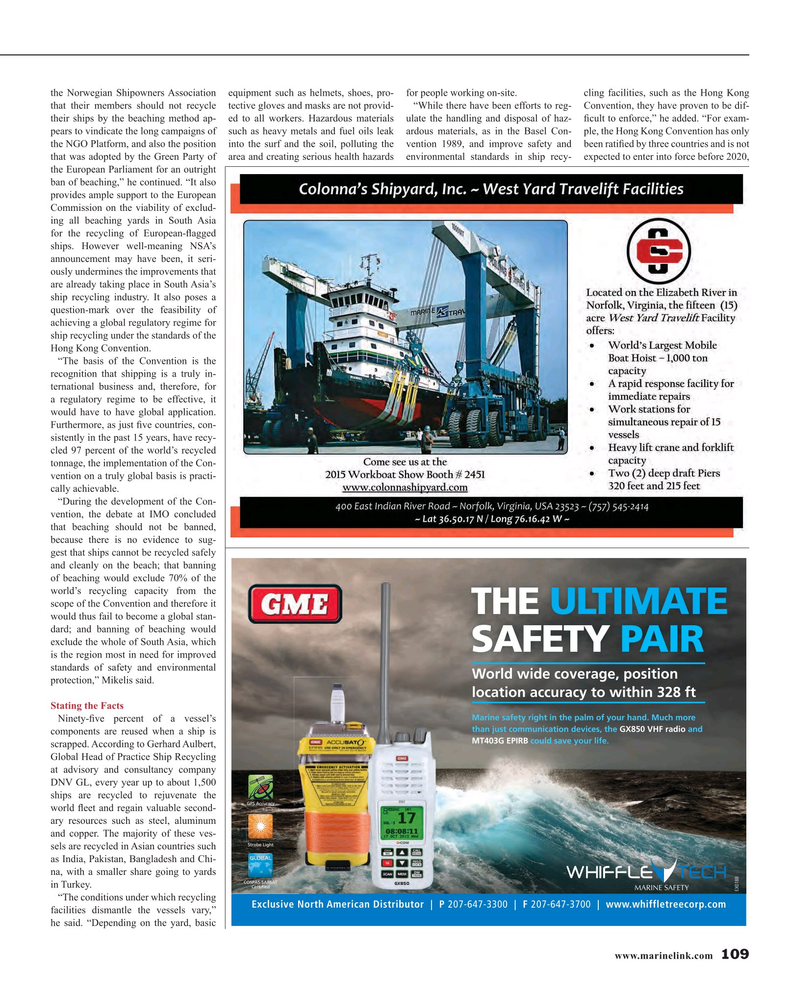
Page 109: of Maritime Reporter Magazine (November 2015)
Workboat Edition
Read this page in Pdf, Flash or Html5 edition of November 2015 Maritime Reporter Magazine
the Norwegian Shipowners Association equipment such as helmets, shoes, pro- for people working on-site. cling facilities, such as the Hong Kong that their members should not recycle tective gloves and masks are not provid- “While there have been efforts to reg- Convention, they have proven to be dif- their ships by the beaching method ap- ed to all workers. Hazardous materials ulate the handling and disposal of haz- ? cult to enforce,” he added. “For exam- pears to vindicate the long campaigns of such as heavy metals and fuel oils leak ardous materials, as in the Basel Con- ple, the Hong Kong Convention has only the NGO Platform, and also the position into the surf and the soil, polluting the vention 1989, and improve safety and been rati? ed by three countries and is not that was adopted by the Green Party of area and creating serious health hazards environmental standards in ship recy- expected to enter into force before 2020, the European Parliament for an outright ban of beaching,” he continued. “It also provides ample support to the European
Commission on the viability of exclud- ing all beaching yards in South Asia for the recycling of European-? agged ships. However well-meaning NSA’s announcement may have been, it seri- ously undermines the improvements that are already taking place in South Asia’s ship recycling industry. It also poses a question-mark over the feasibility of achieving a global regulatory regime for ship recycling under the standards of the
Hong Kong Convention.
“The basis of the Convention is the recognition that shipping is a truly in- ternational business and, therefore, for a regulatory regime to be effective, it would have to have global application.
Furthermore, as just ? ve countries, con- sistently in the past 15 years, have recy- cled 97 percent of the world’s recycled tonnage, the implementation of the Con- vention on a truly global basis is practi- cally achievable.
“During the development of the Con- vention, the debate at IMO concluded that beaching should not be banned, because there is no evidence to sug- gest that ships cannot be recycled safely and cleanly on the beach; that banning of beaching would exclude 70% of the world’s recycling capacity from the scope of the Convention and therefore it
THE ULTIMATE would thus fail to become a global stan- dard; and banning of beaching would exclude the whole of South Asia, which
SAFETY PAIR is the region most in need for improved standards of safety and environmental
World wide coverage, position protection,” Mikelis said.
location accuracy to within 328 ft
Stating the Facts
Marine safety right in the palm of your hand. Much more
Ninety-? ve percent of a vessel’s than just communication devices, the GX850 VHF radio and components are reused when a ship is
MT403G EPIRB could save your life.
scrapped. According to Gerhard Aulbert,
Global Head of Practice Ship Recycling at advisory and consultancy company
DNV GL, every year up to about 1,500 ships are recycled to rejuvenate the world ? eet and regain valuable second- ary resources such as steel, aluminum and copper. The majority of these ves- sels are recycled in Asian countries such as India, Pakistan, Bangladesh and Chi- na, with a smaller share going to yards in Turkey.
EX018B “The conditions under which recycling
Exclusive North American Distributor | P 207-647-3300 | F 207-647-3700 | www.whiffletreecorp.com facilities dismantle the vessels vary,” he said. “Depending on the yard, basic www.marinelink.com 109
MR #11 (106-113).indd 109 11/5/2015 12:05:14 PM

 108
108

 110
110
